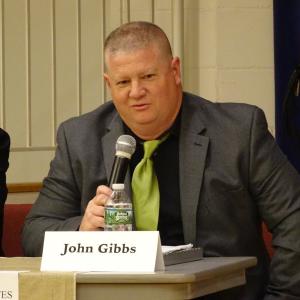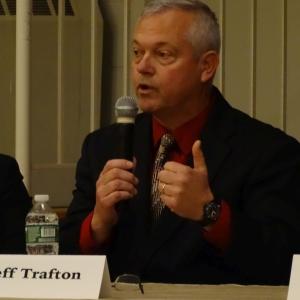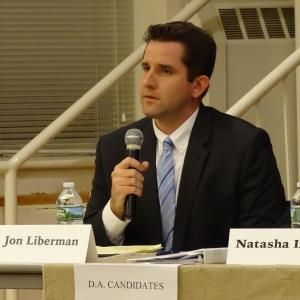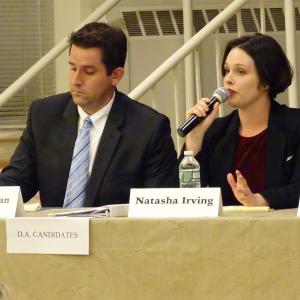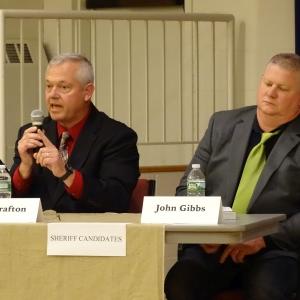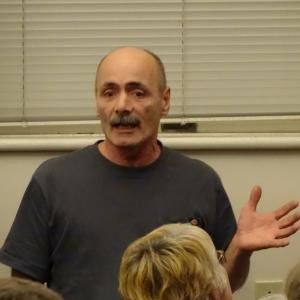District Attorney, Waldo County Sheriff candidates vie for votes at Belfast debate
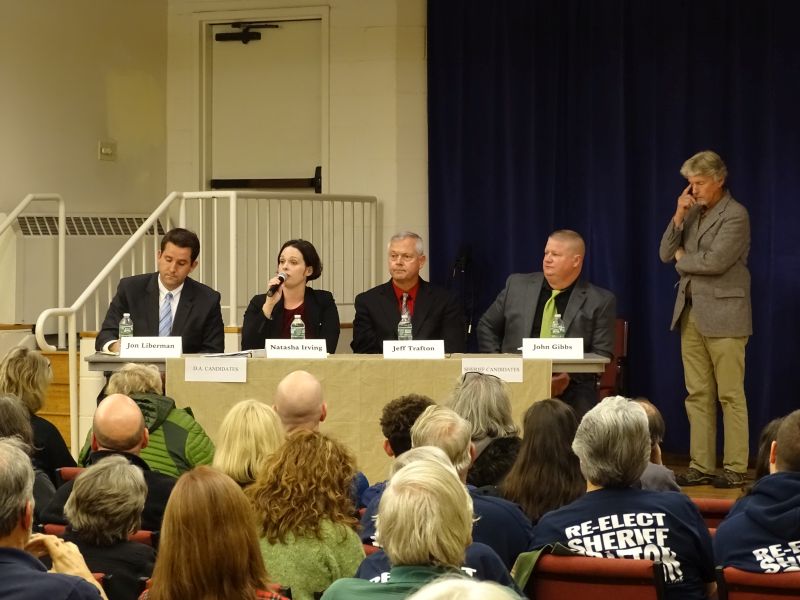


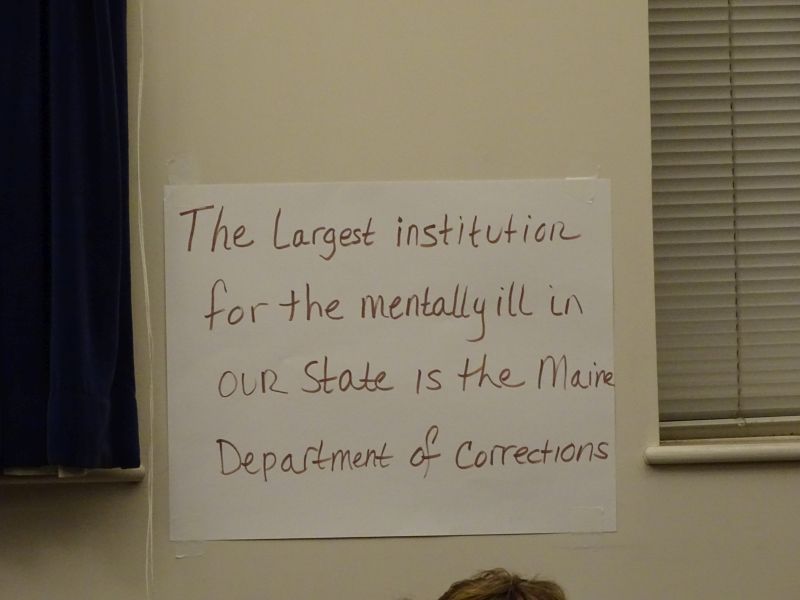
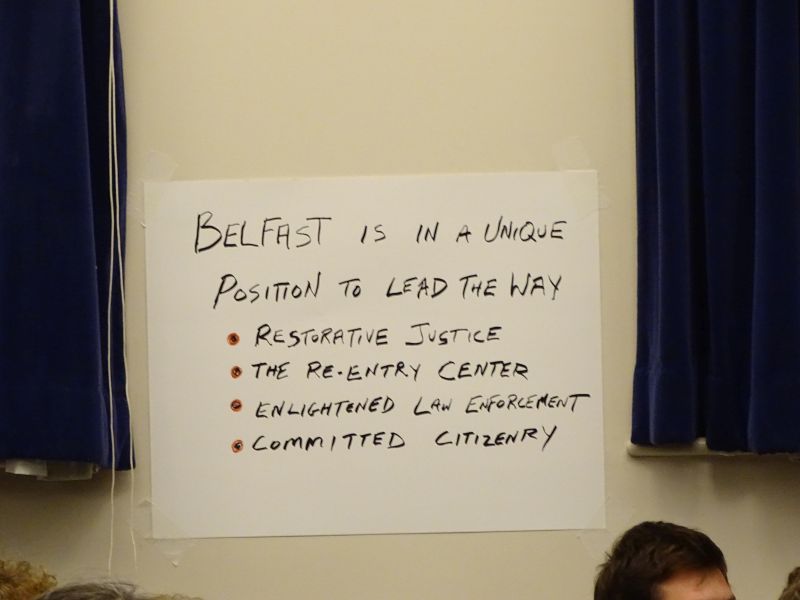

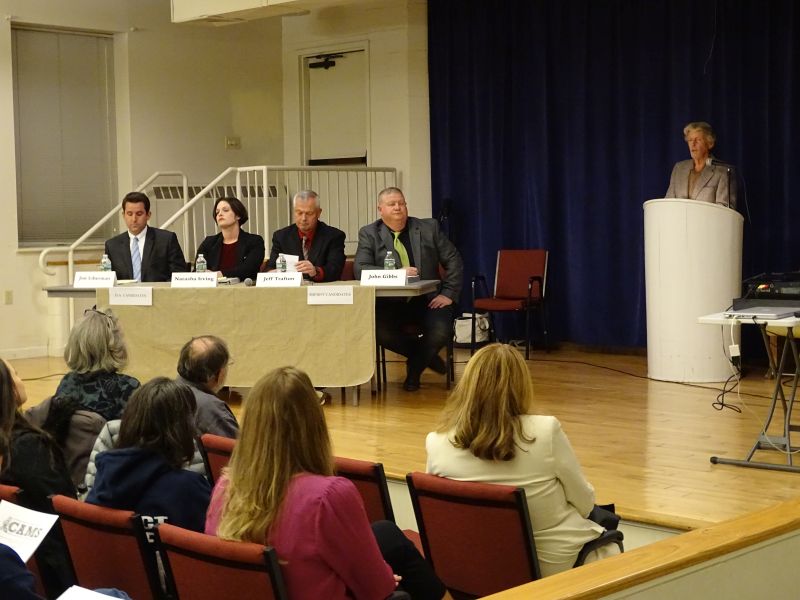
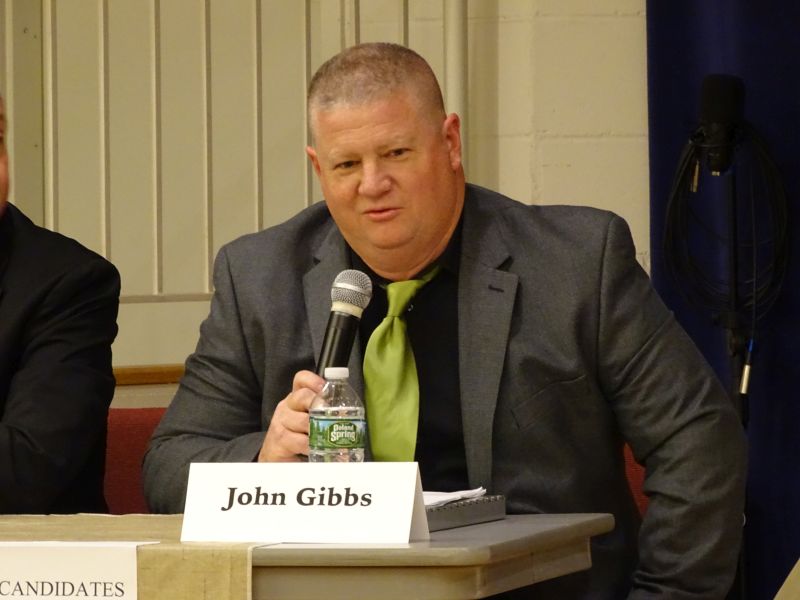
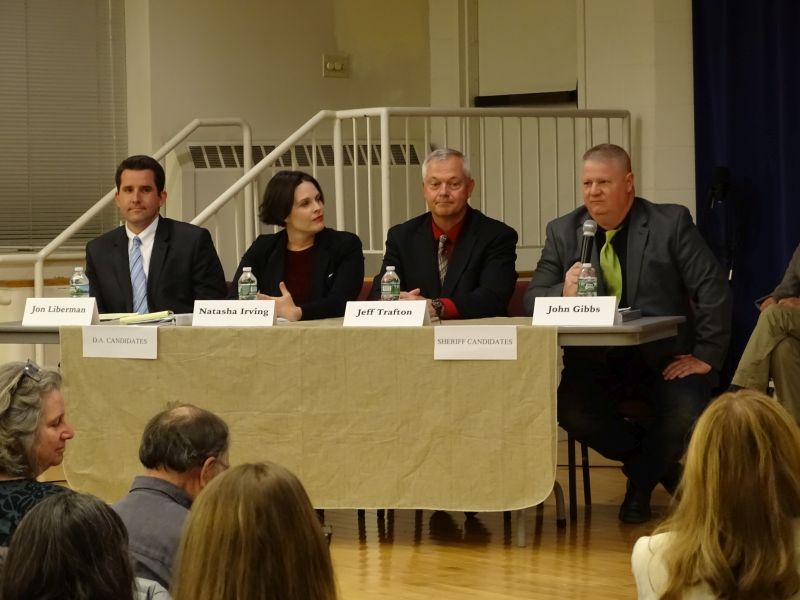 Left to right: Jon Liberman, Natasha Irving, Jeffrey Trafton, and John Gibbs. (photo by Erica Thoms)
Left to right: Jon Liberman, Natasha Irving, Jeffrey Trafton, and John Gibbs. (photo by Erica Thoms)
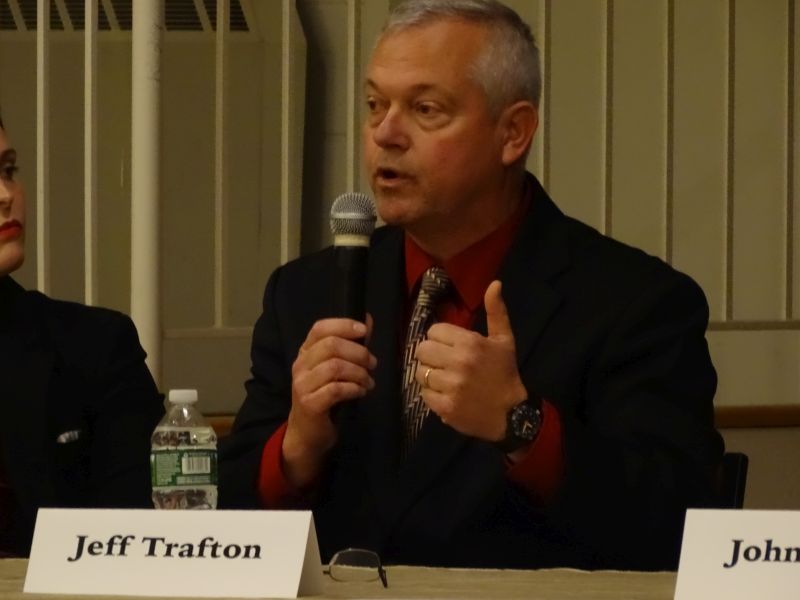 (photo by Erica Thoms)
(photo by Erica Thoms)
 (photo by Erica Thoms)
(photo by Erica Thoms)
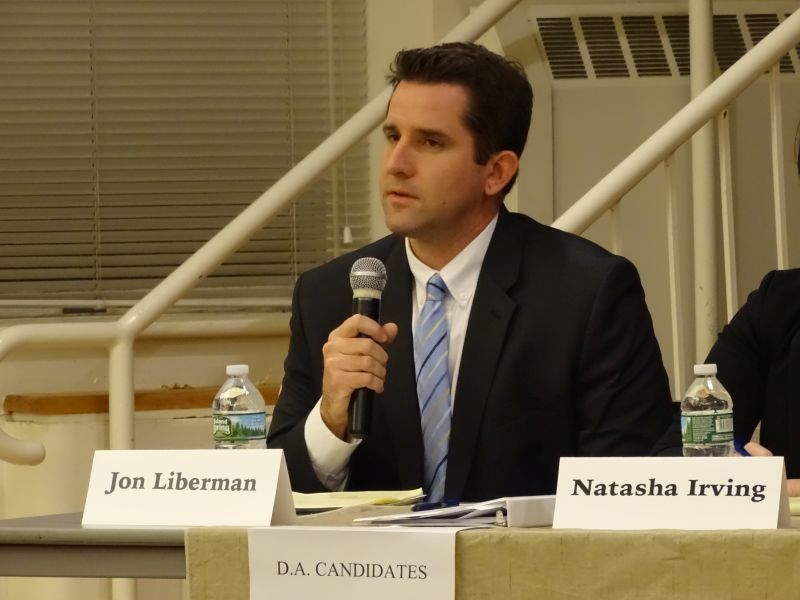 (photo by Erica Thoms)
(photo by Erica Thoms)
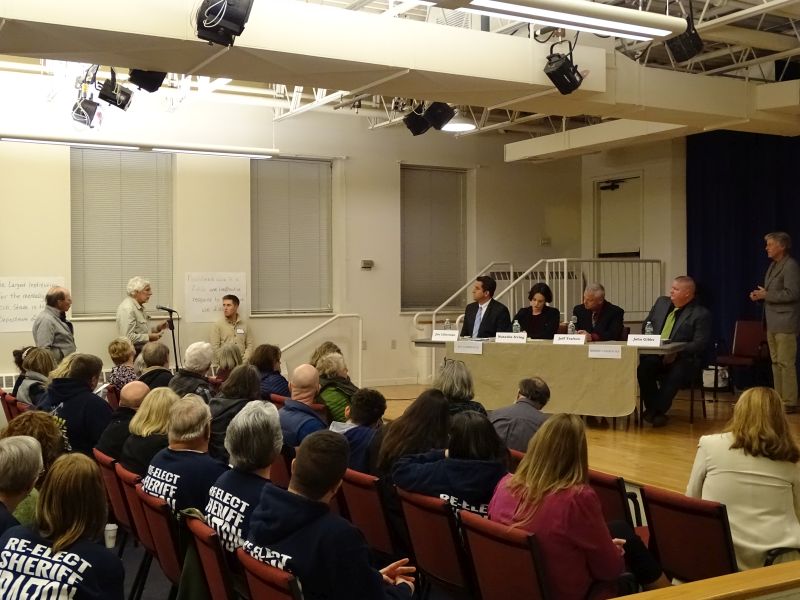 Members of the audience ask the candidates questions. (photo by Erica Thoms)
Members of the audience ask the candidates questions. (photo by Erica Thoms)
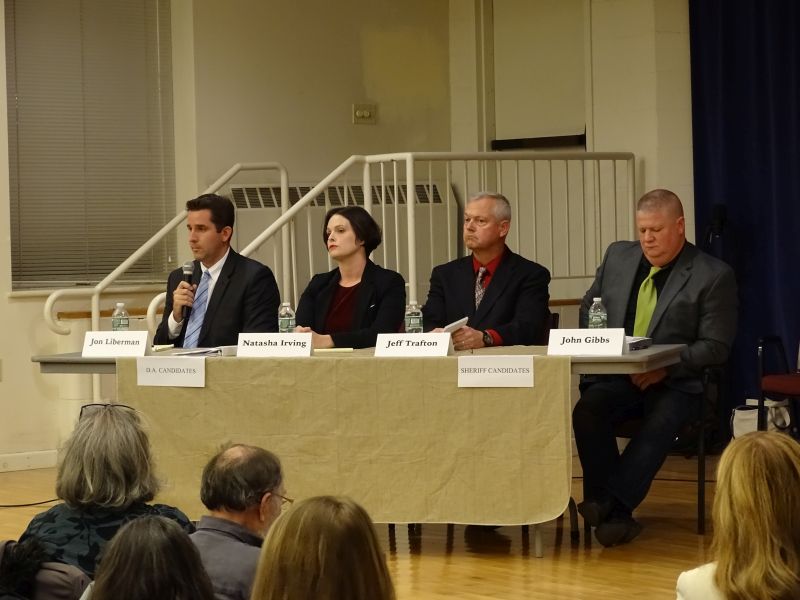 (photo by Erica Thoms)
(photo by Erica Thoms)
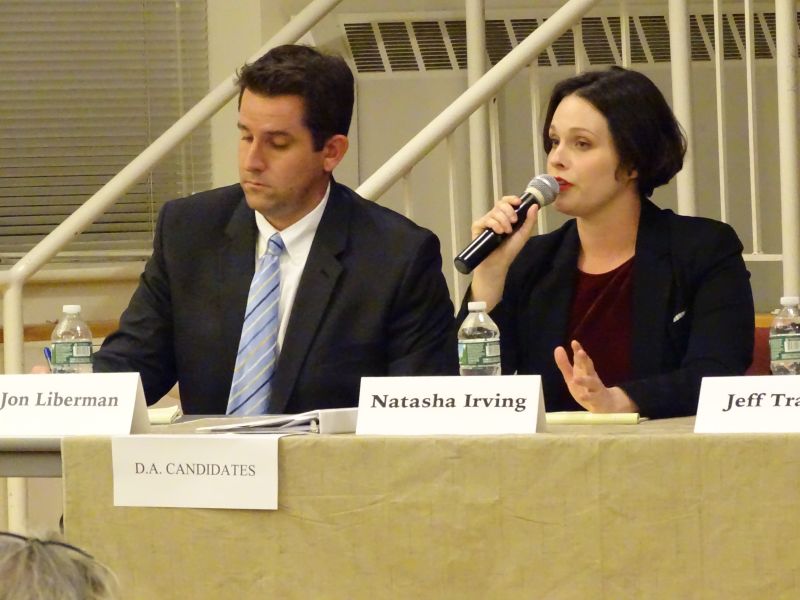 (photo by Erica Thoms)
(photo by Erica Thoms)
 Assistant Attorney General Leane Zainea asked about District Attorney challenger Natasha Irving about her trial experience. (photo by Erica Thoms)
Assistant Attorney General Leane Zainea asked about District Attorney challenger Natasha Irving about her trial experience. (photo by Erica Thoms)
 Members of the audience ask the candidates questions. (photo by Erica Thoms)
Members of the audience ask the candidates questions. (photo by Erica Thoms)
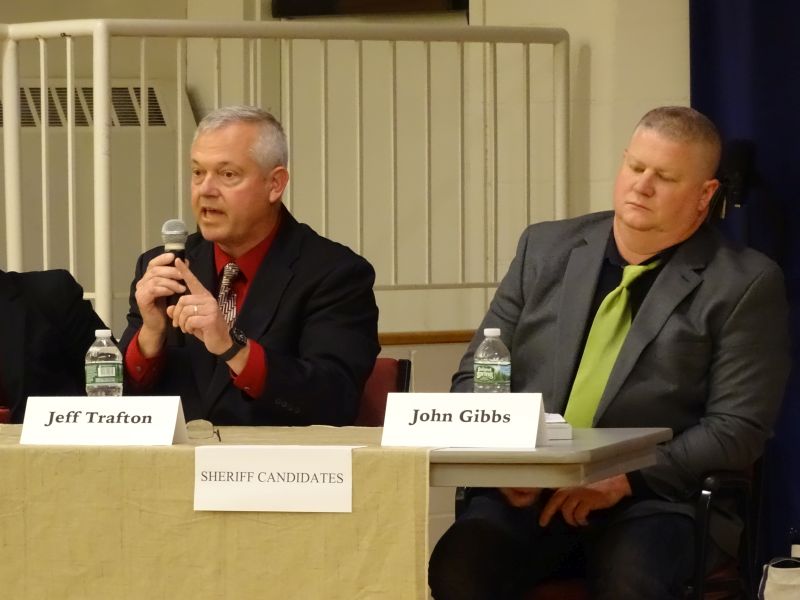 (photo by Erica Thoms)
(photo by Erica Thoms)
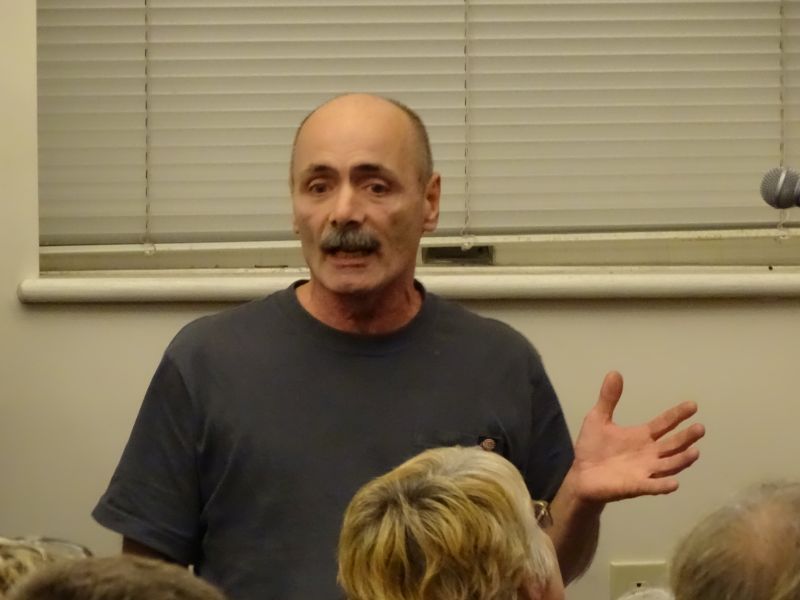 A former Maine Coastal Regional Reentry Center resident speaks to the crowd. (photo by Erica Thoms)
A former Maine Coastal Regional Reentry Center resident speaks to the crowd. (photo by Erica Thoms)
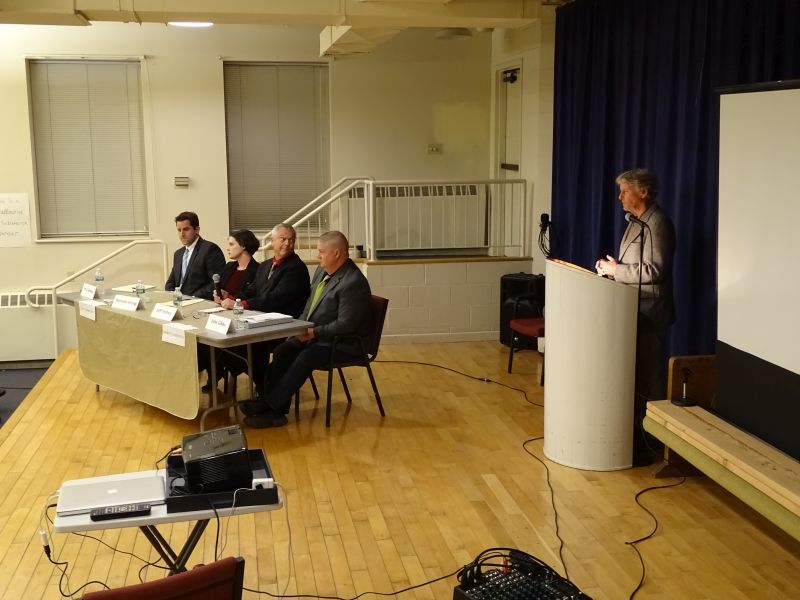 (photo by Erica Thoms)
(photo by Erica Thoms)







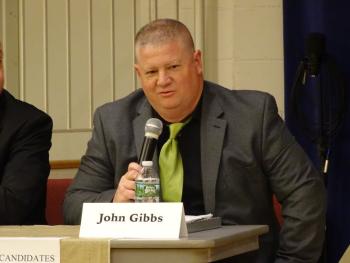
 Left to right: Jon Liberman, Natasha Irving, Jeffrey Trafton, and John Gibbs. (photo by Erica Thoms)
Left to right: Jon Liberman, Natasha Irving, Jeffrey Trafton, and John Gibbs. (photo by Erica Thoms)
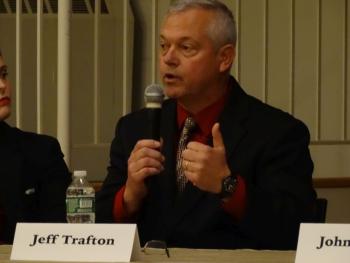 (photo by Erica Thoms)
(photo by Erica Thoms)
 (photo by Erica Thoms)
(photo by Erica Thoms)
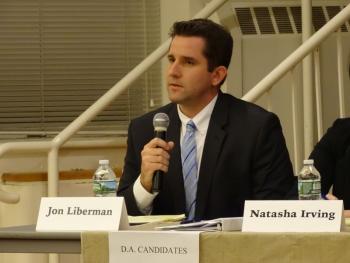 (photo by Erica Thoms)
(photo by Erica Thoms)
 Members of the audience ask the candidates questions. (photo by Erica Thoms)
Members of the audience ask the candidates questions. (photo by Erica Thoms)
 (photo by Erica Thoms)
(photo by Erica Thoms)
 (photo by Erica Thoms)
(photo by Erica Thoms)
 Assistant Attorney General Leane Zainea asked about District Attorney challenger Natasha Irving about her trial experience. (photo by Erica Thoms)
Assistant Attorney General Leane Zainea asked about District Attorney challenger Natasha Irving about her trial experience. (photo by Erica Thoms)
 Members of the audience ask the candidates questions. (photo by Erica Thoms)
Members of the audience ask the candidates questions. (photo by Erica Thoms)
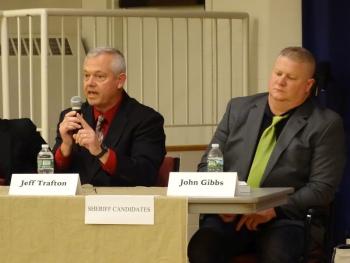 (photo by Erica Thoms)
(photo by Erica Thoms)
 A former Maine Coastal Regional Reentry Center resident speaks to the crowd. (photo by Erica Thoms)
A former Maine Coastal Regional Reentry Center resident speaks to the crowd. (photo by Erica Thoms)
 (photo by Erica Thoms)
(photo by Erica Thoms)
BELFAST — It was a packed house at the Crosby Center for the Community Addiction and Mental health Solutions hosted debate between candidates for Waldo County Sheriff and District Attorney in prosecutorial District Six. That includes Waldo, Knox, Lincoln, and Sagadahoc counties.
The event, which took place Oct. 24, was standing room only after over 100 people claimed the seats filling the room. While originally scheduled to end by 8:30, the debate lasted until nine, with almost the entire crowd remaining for the duration. The debate was live streamed by Belfast Community Television and is available to view on its Facebook page.
Democratic District Attorney candidate Natasha Irving and her Republican opponent, current D.A. Jonathan Liberman, were seated on the left side of the table, while sheriff candidates were seated to the right. Current Sheriff Jeffrey Trafton is running under the Republican ticket while Belfast Police Sergeant John Gibbs is running as an independent candidate for the sheriff’s seat.
Tension between Gibbs and Trafton arose periodically, with the two men exchanging several rebuttals throughout the audience question and answer portion of the debate.
The event was hosted by CAMS, which is a citizen group working to improve outcomes for those struggling with addiction or mental illness. It was cosponsored by the Midcoast Regional Reentry Center, Seaport Family Practice and the Greater Bay Ministerium.
Jeanine Gates, a CAMS member, spoke briefly to the audience ahead of the debate, playing a video about the impact of mental health and addiction on the incarceration and recidivism rates.
Gates said the group chose to focus on the two races between D.A. and sheriff candidates because, “We believe that the winners will have a lot of power over what happens in our community, and because people who have mental health or substance abuse disorders often wind up in jails and prisons rather than the treatment services that would be helpful to them.”
“CAMS is concerned about the arrest, charging, incarceration, and lack of services for people with addiction and mental health issues,” she said, just prior to sharing two videos before the debate began. “We learned that the sheriff has a role in who’s arrested and whether that can be avoided. Once arrested the district attorney decides who gets charged, how severe the charge is, whether they go to jail and whether bond will be required.... Both of these positions are elected, which means we the people are the ones who give them their job and can influence their actions.”
The first video featured a prosecutor who talked about using pretrial services, “that save money and improve outcomes while still keeping the public safe.” The second video illustrated, “how challenging it can be for a sheriff when a jail has a high percentage of mentally ill patients and what he thinks can be done to make it better,” according to Gates.
“Both videos show us that treatment is better than punishment when it comes to preventing crime associated with opioid addiction and mental illness,” she said. “We’ve learned that we can enforce the law, protect the public, spend less money, and save lives if we do a few things differently.”
After the videos ended, the four candidates were invited to make their opening statements to the crowd. They were also asked to answer three questions during their opening statement, including: “What’s the most important issue in your jurisdiction and how will you address it, what qualities in your view, distinguish you from your opponent, and last, how would you rate the ability of our state’s criminal justice system to address the needs of people with severe mental illness and addiction.”
Sheriff candidates
John Gibbs told the crowd about himself and his upbringing. Gibbs was born and raised in Maine, graduated from Mount View High School before attending the University of Maine and receiving an associate’s degree in legal technology in 1989.
“I have four children, three are grown, one is 1-year-old, and I have a granddaughter that’s seven months old, so I’m not afraid of a challenge, as you can see,” he said.
“I began my quest in law enforcement at a young age, growing up hunting, fishing, and trapping in Waldo County,” he said. “I just admired game wardens tremendously and wanted to be one of them. My aspirations were fulfilled but I was laid off and I didn’t return to the warden’s service.”
Gibbs worked briefly as a dispatch and corrections officer at the Waldo County Sheriff’s Office before becoming a part-time police officer in Belfast in 1989. He left the area to pursue a career as a game warden in 1990. After being laid off due to budget issues, Gibbs became a full-time Belfast officer the same year.
“An opening became available because an officer was let go,” he said. “Then, Chief Bob Keating came out, saw me sitting there waiting and said, ‘do you want a full-time job,’ and I said ‘sure,’ and he said, ‘you’re hired,’ so that was how I started at the Belfast Police Department as a full-time officer in 1991. I was only a patrol officer for 14 or 15 months and then I was promoted to detective which... I did for four and a half, not quite five years, and then was promoted to sergeant in the Belfast Police Department in 1997, by then Chief Allen Weaver. I’ve been in that position ever since and feel like I’ve had a very positive influence on our department. I feel like I’ve represented it well and helped grow our department, that it’s today, I think, very well respected.”
“I want to thank all of you for coming here tonight and hope you make an informed decision on who you choose to be your next sheriff, and I know it’s going to be a hard decision,” he said. “Jeff [Trafton] is a good person and it’s something based on what you think will best represent your interests.”
Maine Coastal Regional Reentry Center
A point of contention between sheriff candidates Jeffrey Trafton and John Gibbs is measured success of the Maine Coastal Regional Reentry Center.
While Trafton said the center’s approximate 30 percent recidivism rate compares favorably to the national average of approximately 70 percent, Gibbs, who had in the past expressed his intention to close the Reentry Center should he become sheriff, said there were still areas of the center that could be improved upon.
The summer overdose death of a Reentry Center resident, which happened amongst a spate of several other overdoses, was also raised during the forum.
One audience member attending the forum questioned the candidates, and offered a perspective of the Reentry Center:
“I’m one of the people that was at the Reentry Center. I just finished up a 30 [year] straight bid at the Maine State Prison and I do not know how I would have reentered if not for VOA, if not for the Reentry Center, if not for Restorative Justice, and to want to close a program like that would be a sin because how would I have made [it]?,” he said, gesturing to the world beyond the window he stood near.
“I would have gone somewhere and just… I see it all the time, that revolving door you’re talking about, with people coming in and out and it’s all drug addicts coming in. There is no help for them. Ever since we shut the mental health down in Augusta they’re all going into the prison system and then they’re all coming out and then they’re causing havoc on society because they need these drugs. Well [the] Reentry [Center] gave myself a chance and a lot of guys like me, a chance.
“Now, this guy that died, we know him, he’s a friend of ours. He relapsed. He went in, did the program, worked hard, like all of us.... This is what it’s all about. This is the best they have and it’s gonna work, you’ve just got to see it through, and it’s got to be tweaked,” he said before asking for the panel for their plans for the Reentry Center, Restorative Justice and Volunteers of America.
When it was Trafton’s turn to make his opening statement, he decided to go straight into the three questions the candidates were asked to answer during their opener.
“I want to jump right in, and I think two of the biggest problems that we have in law enforcement and the criminal justice system here in Waldo County, not just Waldo County, I think these are nationwide problems, as we saw in those film clips: the opioid crisis. We’re losing a person almost every day in Maine and that’s just too much. That overlaps... very often we see this at the Sheriff’s Office, at the Reentry Center, we see the overlap of mental illness being involved in the opioid crisis. Because many of these folks, because they don’t have the money to get treatment, because the treatment’s not available for a whole host of reasons, and they try to self-medicate, they become addicted, and then they don’t have the money to support the habit and before they know it they’re in the criminal justice system. Again, it’s not where they belong.
“Those aren’t the only problems. Wwe also have domestic violence [which] I feel is an epidemic that we’re fighting in law enforcement. My whole career we’ve been fighting domestic violence. We continue to fight child abuse, there is too much child abuse, there is too much sexual abuse. I’m convinced that elder abuse is an issue in Waldo County and across the state and the nation, but it’s severely underreported because they’re being abused by the people they love and they don’t want to send those people to jail,” he said.
Trafton cited an email from a college student writing a paper on elder abuse, which made him think of the issue.
He said one of the most common complaints received at the sheriff’s office is about speeders, and the complaints come from every town in the county.
“So there are a lot of challenges for law enforcement and the criminal justice system, but again, opioids and mental health do rise to the top.”
Trafton told the crowd that he sat on the opioid task force in the legislature last year.
“I learned so much about addiction and how it affects people and I heard for the first time... the law enforcement community has finally recognized, we can’t arrest our way out of this folks. We have to collaborate with all these other agencies and systems. We have to work with the D.A.’s office, we work with our victim witness advocates, we work with the medical folks, Seaport Family Practice… We all come together like we’ve done in Waldo County. The Reentry Center, Volunteers of America, Restorative Justice, and we can make a real difference because that’s what we’re doing in Waldo County right now and we want to continue that.”
Trafton served four years in the Marines before leaving to pursue a dual career in the Army National Guard and law enforcement. In 1984 he joined the Maine State Police and was named Trooper of the Year in 1991.
“My first assignment was right near Waldo County and I never left, been here ever since,” he said. “It’s a great place to live and raise my family.”
Trafton was promoted to patrol sergeant supervising troopers in the Midcoast in 1995 before being promoted to lieutenant, supervising patrol operations in the Midcoast in 2000.
“From there in 2005 I retired from the State Police, joined the Belfast Police Department... great organization, I agree with John [Gibbs],” he said.
He became chief of the Belfast Police Department in 2005 and served in the role until 2011, when he joined the Waldo County Sheriff’s Office as chief deputy.
“I loved the years that I was with Belfast,” Trafton said. “The biggest thing I loved about the Belfast Police Department was that it was one town. In the State Police I had five counties and too few people, and in Belfast, I had one town.”
“From there I moved up to the Sheriff’s Office for three years as chief deputy, learned about corrections, the Reentry Center... proud to be part of the Reentry Center and now I’m your county sheriff. How equipped are we to deal with the opioid crisis? I think we’re doing it. I think we’re on the right track and I have a lot of our partners right here in this room here tonight, thank you all for coming. We’re going to continue that effort. There is overlap, we do need to do a better job with the mental health issue, there is no doubt about it. We need to partner with the folks in Augusta and NAMI, the National Alliance for the Mentally Ill, just like we’re doing with the opioid problem here. We also need help from above, the state has to step up and give us more beds,” he said to applause.
Trafton, who has served as sheriff for the last four years, retired from the National Guard as a Captain in 2001.
District Attorney candidates
The first district attorney candidate to speak was Natasha Irving, who told the crowd Belfast is her “favorite city in the whole world” before beginning her statement.
“I’m running for district attorney to bring community-based restorative justice to the Midcoast,” she said. “The criminal justice system is mired in the mindset of ‘tough on crime,’ or ‘if you do the crime you do the time.’ This has led to the mass incarceration of the mentally ill, the addicted, and overwhelmingly poor folks in our community. This is a waste of taxpayer dollars and it is squandering the very lifeblood of our community: our people. Jail and prison are not a solution to mental illness and addiction, treatment is. Jail and prison for mental illness contribute to recidivism and ensures that the never-ending cycle of crime and punishment, all at the taxpayer expense, will continue,” she said.
“The current district attorney is more intent on punishing nonviolent re-offenders than protecting us from violent offenders, exhibited in the slap-on-the-wrist sentences for the predators who target our children, our elderly, and their own family. Community-based restorative justice transforms how we serve justice and how justice serves us. Community-based restorative justice is the only way to end the cycle of incarceration of the mentally ill and [the] addicted in our community. Community-based restorative justice is the only way to ensure that victims are made whole. Community-based restorative justice demands that community service be paid for non-violent misdemeanor offenses. Community treatment for mental illness and addiction a focus is placed on the healing of victims and not on costly punishment,” she said.
“I have watched a man removed from treatment to serve 60 days in jail for a heroin possession charge. I have clients commit the felony offense of attempting to bring their own medication into the jail to avoid excruciating withdrawal and the certainty of relapse upon release. I have seen a homeless teenager offered seven days, a seven-day sentence, for stealing $6.02 worth of food. I’ve seen clients children taken from them and placed in foster care, all so they can do a jail sentence for a non-violent offense. I’ve had clients relapse and have their probation revoked, only to be evicted from their housing and lose all their earthly possessions. No clothes, no home, no job, now a criminal history and a raging disease that has been festering untreated in jail.
“This is not the solution to addiction and mental illness, we need to focus our resources on protecting our children, our elders, folks in our community who are vulnerable and prosecuting serious offenses that damage the community. Violent crimes and sex offenses must be vigorously prosecuted. Incarceration must be reserved for those who are truly dangerous... Who harm our families, friends, our neighbors, and our communities. It cannot continue. The criminal justice system, jails, and prisons cannot become our new asylums or warehouse for people with addiction in lieu of rehabilitation,” she said before speaking about her opponent.
“Mr. Liberman is going to talk about his experience as a prosecutor, but he doesn’t have experience as an advocate for problem solving courts, like drug court, veterans court, mental health court, an advocate at the legislature for common-sense law changes like the mandatory testing of rape kits and the entry of that date into the federal CODIS [the Combined DNA Index System] system or the database that tracks those offenses. An advocate for recovering our community, for a recovering community, an advocate for our taxpayers, and an advocate for victims of crime. I am an advocate. I am an advocate that has and will continue to fight for real criminal justice reform. I witness on a daily basis what is at stake and it is the future of our community. The criminal justice system is broken, but not irreparably. I am running to implement community-based restorative justice because the criminal justice system has the potential to help restore and heal our community,” she said.
Irving was born and raised in Waldoboro and studied philosophy at Loyola University in New Orleans. She spent a year of service in AmeriCorps before returning to Maine to attend the University of Maine School of Law. Irving decided to run for district attorney after working as a defense attorney, small business owner, and member of the MSAD 40 School Board.
When it was his turn to speak, current District Attorney Jon Liberman began his statement by introducing himself and thanking the crowd for the great turnout.
“One of the things that I was first told by a judge when I started prosecuting, it was one of my first days in court, it’s a judge that’s now retired, called me into chambers before court started, and he gave me some advice that has really held true throughout my career. He said, ‘Jon, you’re going to be dealing with roughly three types of people in the criminal justice system. The first group is the good person who just had a really bad day. It’s important to be fair, one way or another you’re very unlikely to see that person again, so be fair, don’t break them. They’re going to continue to be a good person, they just messed up.’ The opposite extreme of that is, you do occasionally run into people who are inherently evil and dangerous, people who prey on others, people who are always going to be dangerous when they’re out.
“I’m happy to say that in my experience and in doing this, prosecuting, for close to 10 years, I have not found that most of the people that we deal with in the system fit that mold. That’s good, it’s not like dealing with… you know, when you watch Law and Order on TV you get this impression that every single defendant in the system is evil, and it’s not like that. I’m also happy to say that for the most part, defense attorneys and prosecutors actually work pretty well together to try to come up with solutions that can address both public safety and also things like rehabilitation and treatment,” he said.
“That by the way, before I get too carried away on that, brings us to the third group of people that the judge told me about. That was the mental health/substance abuse revolving door and one of the things he said to me was that this is the group that will take up most of your time and energy, this is the group that can be the most difficult to deal with. If you are able to get them on the right plan when it comes to rehabilitation and treatment, then you’ll never see that person again. It is easier said than done. It requires constant effort, it requires constant self-reflection. Take a look at what you’ve done that doesn’t seem to be working, take a look at the things you’ve done that do seem to work.”
Liberman then moved on to answer one of the questions posed by moderator Jay Davis.
“I think I can answer one of the questions about some of the biggest issues facing our system. I think that’s it right there, the mental health/addiction revolving door. I also agree with Sheriff Trafton that there are other things facing our system that we can’t neglect, such as sexual assault, domestic violence, elder abuse is a huge problem and in particular, the underreporting of elder abuse. That is very real. It’s something that’s going on probably right under all of our noses, but that unfortunately a lot of times goes unreported both to the Department of Health and Human Services, law enforcement agencies, etc.
“When it comes to treatment of substance abuse and mental health issues and what we’re doing in the system, I think there are a lot of things that we do that go unrecognized or unreported. We work very closely with various jail diversion programs. When we put someone on bail if someone gets arrested and Maine Pretrial Services or a Sheriff’s Office jail diversion program is willing to supervise, that can be a great tool right there because you can get the person on substance abuse conditions requiring them to participate in substance abuse counseling.”
Liberman briefly stopped his opening statement to ask about audible singing coming through the walls of the room (which happened throughout the event). That prompted an outburst of laughter from the crowd. After being told it was the play The Crucible being rehearsed next door, he said, “oh, alright, I thought I was hallucinating or something,” to more laughter, before finishing the last minute of his allotted five.
“The other thing that we do is, jails have home community confinement programs where if a person serves a portion of their sentence they can be out supervised in the community. Waldo County is very fortunate to have the Midcoast Regional Reentry Center, which is an excellent program. And probation officer folks, probation officers are truly on the front lines when it comes to this substance abuse/mental health issue and the way probation officers now… they are way more forgiving now than they even were five years ago. If they have someone who relapses, it often takes a few times before a probation violation will be in the system. They try really hard to adjust treatment rather than throwing them back into the system. As far as the difference between myself and my opponent, the biggest thing I could talk about would be experience. Not just trial experience, but I believe experience managing an office, managing budgets, and managing personnel, both with county staff and personnel and the assistant district attorneys that I work with... I have close to 30 people that I supervise.”
Liberman grew up in Bath and currently lives in Bath. He graduated from the University of Maine School of Law in 2010 and began work as an assistant district attorney in Maine Court District VI. Liberman was appointed deputy district attorney to District Attorney Geoffrey Rushlau and was appointed district attorney in 2017 when Rushlau was nominated to Maine District Court Judge.
Voters now have less than two weeks to determine who they will cast their Nov. 6 ballot for.
Erica Thoms can be reached at news@penbaypilot.com
Event Date
Address
United States








